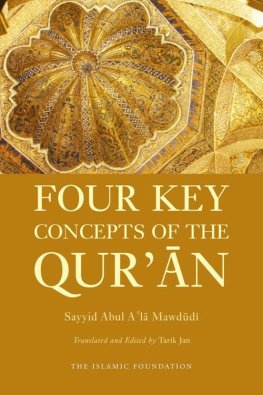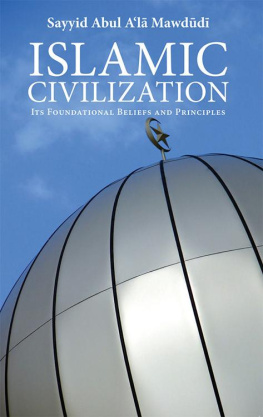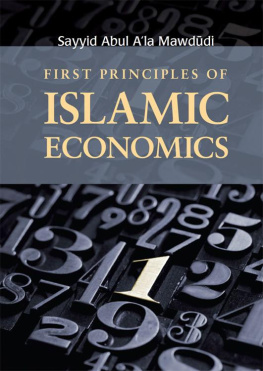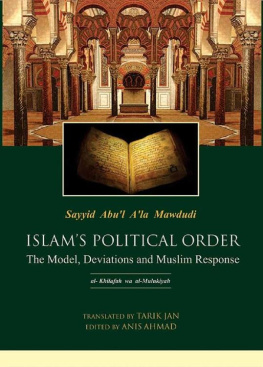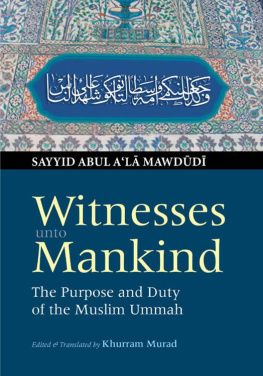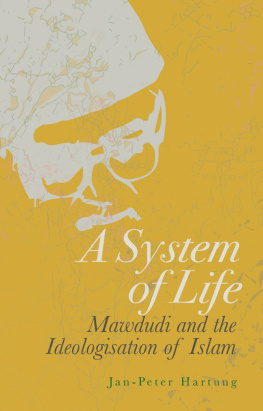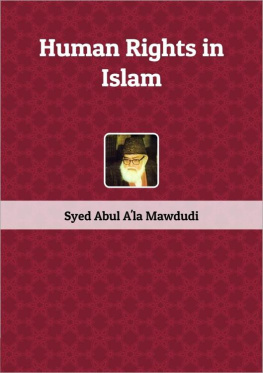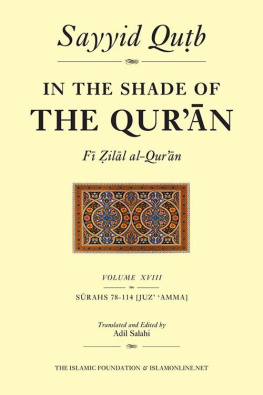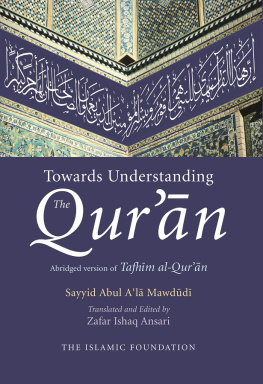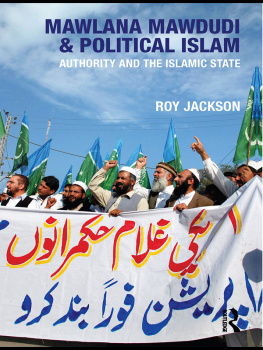Sayyid Abul Ala Mawdudi - Four Key Concepts of the Quran
Here you can read online Sayyid Abul Ala Mawdudi - Four Key Concepts of the Quran full text of the book (entire story) in english for free. Download pdf and epub, get meaning, cover and reviews about this ebook. year: 2013, publisher: Kube Publishing Ltd, genre: Religion. Description of the work, (preface) as well as reviews are available. Best literature library LitArk.com created for fans of good reading and offers a wide selection of genres:
Romance novel
Science fiction
Adventure
Detective
Science
History
Home and family
Prose
Art
Politics
Computer
Non-fiction
Religion
Business
Children
Humor
Choose a favorite category and find really read worthwhile books. Enjoy immersion in the world of imagination, feel the emotions of the characters or learn something new for yourself, make an fascinating discovery.
- Book:Four Key Concepts of the Quran
- Author:
- Publisher:Kube Publishing Ltd
- Genre:
- Year:2013
- Rating:5 / 5
- Favourites:Add to favourites
- Your mark:
- 100
- 1
- 2
- 3
- 4
- 5
Four Key Concepts of the Quran: summary, description and annotation
We offer to read an annotation, description, summary or preface (depends on what the author of the book "Four Key Concepts of the Quran" wrote himself). If you haven't found the necessary information about the book — write in the comments, we will try to find it.
Sayyid Abul Ala Mawdudi: author's other books
Who wrote Four Key Concepts of the Quran? Find out the surname, the name of the author of the book and a list of all author's works by series.
Four Key Concepts of the Quran — read online for free the complete book (whole text) full work
Below is the text of the book, divided by pages. System saving the place of the last page read, allows you to conveniently read the book "Four Key Concepts of the Quran" online for free, without having to search again every time where you left off. Put a bookmark, and you can go to the page where you finished reading at any time.
Font size:
Interval:
Bookmark:
 l Mawdd
l MawddPublished by
The Islamic Foundation
Markfield Conference Centre
Ratby Lane, Markfield
Leicestershire, LE67 9SY, United Kingdom
Tel: 01530 244944/5, Fax: 01530 244946
E-mail:
Website: www.islamic-foundation.org.uk
Quran House, P.O. Box 30611, Nairobi, Kenya
P.M.B. 3193, Kano, Nigeria
Copyright The Islamic Foundation, 2006/1427 H
All rights reserved. No part of this publication may be reproduced, stored in a retrieval system, or transmitted in any form or by any means, electronic, mechanical, photocopying, recording or otherwise, without the prior permission of the copyright owner.
British Library Cataloguing-in-Publication Data
Mawdudi, Syed Abul Ala, 1903-1979
Four key concepts of the Quran
1. Koran commentaries
I. Title II. Jan, Tarik III. Islamic Foundation (Great Britain)
297.1226
ISBN 978-0-86037-572-2
Cover/Book design & typeset: Nasir Cadir
Arabic Consonants:
Initial, unexpressed medial and final:

Vowels, diphthongs, etc.

THE MUSLIM Ummah is passing through a critical phase. This is not something new as its entire history is characterized by challenges and responses, crisis and re-emergence, relapse and revival. In a sense, this was inevitable. A message as universal and eternal as Islam cannot escape challenges that come with the passage of time and consequent crisis situations. As such it is only through phases of retreat and renewal, and in some cases even disintegration and re-consolidation that an eternal message can remain relevant and a pace-setter for new situations. It was also unavoidable because the very divine arrangement for humans as Gods Khalfah (Vicegerent) endowed them with freedom and discretion, hence the prospect of error and correction. Built in the Islamic scheme are elements that are permanent and unchangeable, and as such, constitute the reference points for the system for all times. Along with these are elements that are flexible and changeable, still remaining within the Divinely laid ethos of the system. The sensitive equation between the permanent and the changing sets the evolutionary path of Islam in history. That is how every set-back has been followed by an upsurge throughout the Islamic history. Islam has been the source of every effort at renewal and reassertion.
Todays situation has great similarity with the scenario faced by the Ummah at the beginning of the twentieth century, some significant differences notwithstanding. By the end of the nineteenth century, the Muslim Ummah, which had played a distinguished role as a world power for over a millennium, was then totally overwhelmed by the forces of decay within and the onslaughts of ascending European imperialisms from abroad. The power-equation changed to the utter disadvantage of the Muslim World. It had far-reaching consequences for the entire realm of Muslim civilization. Western imperial powers represented a new civilizational paradigm. The expansionist role of the imperial powers that vitiated Islams hold on social dynamics defined its predicament: the Muslims had lost their leading edge over knowledge and technology, their economies were in a shambles, their political power eclipsed. Even morally, culturally and intellectually the Ummah went into a tailspin. The lowest point was the abolition in 1924 of what was left of the symbolic khilfah.
This was the context in which a number of Muslim luminaries all over the world addressed themselves to the crucial questions of what had gone wrong with the Muslim Ummah? Had Islam become irrelevant or was something wrong with the Muslim approach to Islam, its role in history, in short the way the Muslims were treating the Divine guidance? And finally how the Ummah could reset itself along the path to revival and reconstruction? Jaml al-dn Afghn, Amr Shakb Arsaln, Prince alm Psh, Sa d Nrs, Muammad Iqbl, Rashd R, Muammad
d Nrs, Muammad Iqbl, Rashd R, Muammad  Abduh, asan al-Bann, Ashraf
Abduh, asan al-Bann, Ashraf  Al Thnaw, Abul Kalm zd, Abul A
Al Thnaw, Abul Kalm zd, Abul A l Mawdd, Mlik bin Nab, Abul asan
l Mawdd, Mlik bin Nab, Abul asan  Al Nadw and a host of intellectuals and reformers reflected on these questions and came up with positive responses to steer the Ummah out of decay. In this galaxy of thinkers and reformers, Mawdd occupies a distinct position. Hardly seventeen, in 1920 he initiated the task of rebuilding the Muslim Ummah. After ten years of journalistic encounters, he decided to begin his endeavour to reconstruct Muslim thought and to spell out Islam as a worldview and a way of life. His aim was to develop a comprehensive plan of action for the Ummahs revival as a blessing for humanity. The publication of al-Jihd f al-Islm (law of War and Peace in Islam) in 1929 was his first such major contribution. And ever since, until his death on 22nd September, 1979, he authored over 140 books and tracts on Islam, covering almost every aspect of its thought and message. His greatest work is a six-volume exegesis of the Qurn Tafhm al-Qurn spanning several thousand pages. Besides articulation and reconstruction of Islamic thought, he developed a critique of the Muslim society, identifying the causes of their decline. His effort was to make the Muslims realize how and why they lost their grip on their own affairs, resulting in political, economic and intellectual decline. He also came up with a powerful critique of the Western civilization, the main player in the contemporary onslaught on Islam. He was not oblivious to the positive achievements of the Western civilization, the sources of its strength and weakness and the ideologies it had spun. But at the same time, he was critical of its intellectual confusion, its moral deprivations, its political and cultural deformities and its economic injustices and exploitations. His thought has influenced three generations of Muslims. Small wonder he is considered as one of the chief architects of contemporary Islamic revival.
Al Nadw and a host of intellectuals and reformers reflected on these questions and came up with positive responses to steer the Ummah out of decay. In this galaxy of thinkers and reformers, Mawdd occupies a distinct position. Hardly seventeen, in 1920 he initiated the task of rebuilding the Muslim Ummah. After ten years of journalistic encounters, he decided to begin his endeavour to reconstruct Muslim thought and to spell out Islam as a worldview and a way of life. His aim was to develop a comprehensive plan of action for the Ummahs revival as a blessing for humanity. The publication of al-Jihd f al-Islm (law of War and Peace in Islam) in 1929 was his first such major contribution. And ever since, until his death on 22nd September, 1979, he authored over 140 books and tracts on Islam, covering almost every aspect of its thought and message. His greatest work is a six-volume exegesis of the Qurn Tafhm al-Qurn spanning several thousand pages. Besides articulation and reconstruction of Islamic thought, he developed a critique of the Muslim society, identifying the causes of their decline. His effort was to make the Muslims realize how and why they lost their grip on their own affairs, resulting in political, economic and intellectual decline. He also came up with a powerful critique of the Western civilization, the main player in the contemporary onslaught on Islam. He was not oblivious to the positive achievements of the Western civilization, the sources of its strength and weakness and the ideologies it had spun. But at the same time, he was critical of its intellectual confusion, its moral deprivations, its political and cultural deformities and its economic injustices and exploitations. His thought has influenced three generations of Muslims. Small wonder he is considered as one of the chief architects of contemporary Islamic revival.
Mawdd, along with being a great thinker and a visionary, was also a reformer and an activist committed to strive for social change and historic transformation. He founded in 1941, for moral and socioeconomic change, the Jam at-e-Islm, a movement to pilot Islamic resurgence, initially in the South Asian Sub-continent, but ultimately as part of a global movement for the establishment of a just world order.
at-e-Islm, a movement to pilot Islamic resurgence, initially in the South Asian Sub-continent, but ultimately as part of a global movement for the establishment of a just world order.
The need for translating Mawdds essential writings into the English language was never as pressing as it is today. The translations I did in the 1960s and those that Br. Khurram Murad did in the 1980s cover hardly twenty percent of his work. The World of Islam Trust, Islamabad, the Islamic Research Academy, Karachi and the Islamic Foundation, Leicester have now agreed to co-sponsor English translations of his essential works. The manuscripts would be prepared under my general supervision and editorship, assisted by Dr. Anis Ahmad, Dr. Manazir Ahsan and Dr. A.R. Kidwai. Tarik Jan and Shafaq Hashemi would do the major work of translation and compilation. Other competent translators would also be involved in this project. The Madinah Trust, Peterborough, and the Sarwar Jehan Charitable Foundation, Leicester, U.K. are also extending some limited financial support for the project.
Font size:
Interval:
Bookmark:
Similar books «Four Key Concepts of the Quran»
Look at similar books to Four Key Concepts of the Quran. We have selected literature similar in name and meaning in the hope of providing readers with more options to find new, interesting, not yet read works.
Discussion, reviews of the book Four Key Concepts of the Quran and just readers' own opinions. Leave your comments, write what you think about the work, its meaning or the main characters. Specify what exactly you liked and what you didn't like, and why you think so.

